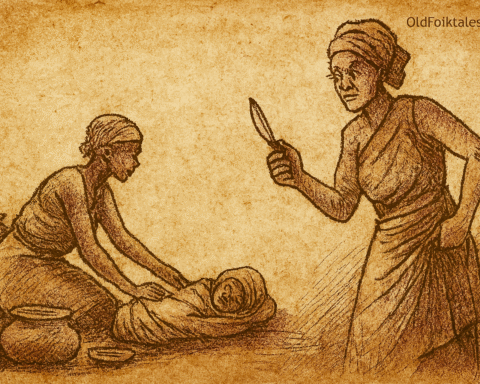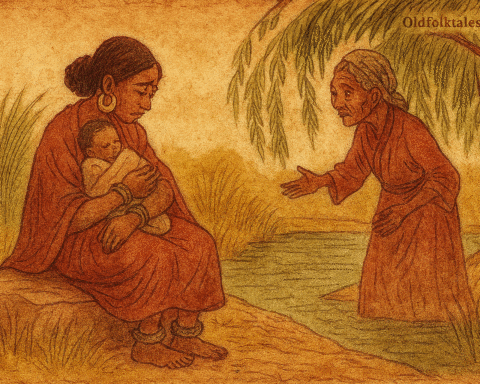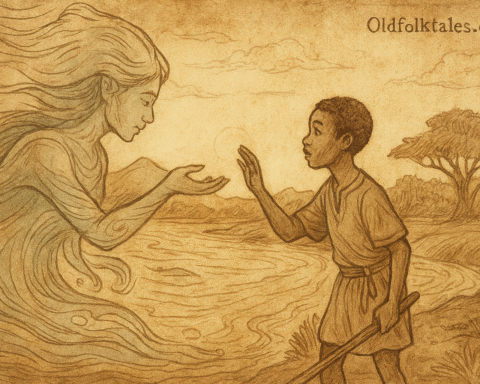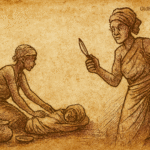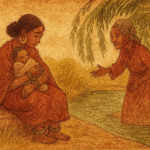Their friendship was a marvel to behold. They journeyed together across vast savannas, their shadows dancing side by side under the African sun. At night, they shared the same sleeping mat, and when hunger called, they ate from the same wooden bowl, their beaks touching as they picked at millet and grain. Hawk had blessed his nest with four precious children, while Hen proudly watched over seven little ones. The children of both families played together in the red dust of the compound, their laughter echoing like birdsong at dawn.
But joy, like the rains, does not fall evenly upon all seasons.
Also read: Why Pigs Root in the Earth
One morning, as the first golden light painted the horizon, Hawk awoke to find his oldest child burning with fever. The little one’s skin had erupted in painful scabies that spread like angry red thorns across his small body. His tiny frame shook with heat, and his plaintive cries pierced his father’s heart like poisoned arrows.
For weeks, Hawk and Hen worked side by side with desperate devotion. They took turns gently cleaning the festering wounds, their beaks tender as they applied soothing palm oil to the inflamed skin. The aromatic oil glistened in the firelight as they worked through long nights, but despite their loving care, the child’s suffering only deepened.
As hope began to fade like smoke from a dying fire, Hawk remembered the renowned healer who lived across the great valley. Mbe-the-Cockroach was celebrated throughout the region as a masterful doctor, her knowledge of healing herbs surpassing even the wisest elders. Though his heart was heavy with worry, Hawk felt a flicker of hope return.
But there was a problem that gnawed at Hawk’s mind like termites in wood. Throughout the land, it was well known that Cockroach and Hen harbored bitter hatred for each other. When Hen looked upon Cockroach, all she saw was a plump, juicy morsel perfect for her hungry stomach. The enmity between them was as old as the first rains and as deep as the ancient baobab roots.
Still, Hawk’s friendship with Hen had weathered many seasons. Surely such a bond could withstand this trial. He consoled himself with the wisdom that clouds do not always bring rain, though he ignored the equally true saying that a leopard cub’s spots appear long before it grows old.
Throwing caution to the wind like scattered grain, Hawk flew to Cockroach’s dwelling and fell to his knees in desperate pleading.
“Great healer,” he begged, his voice cracking with emotion, “my child lies dying. Please, I beg you to help us in our darkest hour.”
Cockroach’s compound eyes studied Hawk’s anguished face with compassion. “Go back to your child,” she said softly. “I will gather my medicines and come as soon as I can.”
Hawk returned home and waited through the long afternoon, watching the sun crawl across the sky like a dying ember. Finally, as evening twilight painted the earth in purple shadows, Cockroach arrived carrying a small leather bag filled with precious healing herbs.
The moment Hen’s sharp eyes fell upon the approaching healer, her entire body erupted in fury. Her wings beat the air like thunder as she clucked and circled the compound in aggressive loops, dust swirling beneath her agitated feet.
“Cockroach!” Hen shrieked, her voice sharp as broken pottery. “You dare call yourself a healer? Are these few pitiful herbs all this child needs?” She immediately picked a bitter quarrel as Cockroach crossed the threshold. “You haven’t brought enough medicine because you want Hawk’s child to die! I see through your evil plan!”
Cockroach, with the dignity of one who had saved many lives, ignored Hen’s accusations. She settled gracefully onto the mat Hawk offered and carefully removed her precious herbs from the leather bag. With practiced hands, she arranged them on a broad plantain leaf in three neat piles, each containing different healing powers.
“Listen carefully,” Cockroach instructed Hawk, her voice calm despite Hen’s continued ranting. “Soak these leaves in warm water every morning and evening. Use this infusion to bathe your child’s entire body. After bathing, apply this mero ngwob—python’s oil, directly to the wounds. It will heal the scabies and help the child sleep peacefully. I will return each evening with medicine for him to drink. Your child should recover within a week.”
“I don’t trust you!” Hen interrupted, her throat bitter with rage. “Hawk should never have brought you here!”
Cockroach’s eyes flashed with controlled anger. “Why haven’t you treated the child yourself, since you claim to know our healing ways so well?” she retorted sharply. Then, turning to Hawk: “Put water on the fire immediately.”
This rebuke sent Hen into a frenzy that shook the very foundations of the compound. She was, as the Beba people say, bitter-in-the-throat with uncontrollable fury. Her wings beat the air with such violence that dust clouds rose like small storms. She clucked and shrieked as she circled the nsaa, her cries echoing through the treetops and frightening even the boldest creatures.
But her rage had not yet reached its terrible peak.
To everyone’s horror, Hen suddenly pounced upon the carefully arranged plantain leaf with her sharp talons. She scratched and tore at the precious medicines, sending healing herbs flying through the air like scattered hopes. Hawk watched in utter consternation as his child’s salvation was destroyed before his very eyes.
Cockroach, maintaining her professional dignity, paid no attention to this destruction and continued examining the sick child. But Hen, consumed by jealous fury, would not be ignored.
With lightning speed, she approached the devoted healer and, with one swift, deadly peck, sank her sharp beak deep into Cockroach’s body. In one loud, terrible gulp, she swallowed the only hope Hawk’s child had for survival.
Silence fell over the compound like a burial shroud.
There was no one else Hawk could turn to, no other healer with such knowledge and skill. His child lived only a few more agonizing hours before joining the ancestors, leaving behind a father whose heart had turned to stone.
Now it was Hawk’s turn to be bitter-in-the-throat. His fury burned hotter than the forge fires as he stared at Hen, the friend who had destroyed his world. She should have remembered the ancient wisdom that one does not defecate where one sleeps, for as the pepper suffers in the grinding, so too does the grinding stone.
Hawk’s eyes blazed with righteous anger as he looked directly at Hen and spoke his fateful oath: “The fate of the pot will also be that of the yam, or my name isn’t Hawk!”
Without hesitation, he sought immediate revenge by killing one of Hen’s precious children. Then, with blood still fresh on his talons, he made a solemn vow that would echo through all generations: to kill any of Hen’s children whenever and wherever their paths crossed, until the end of time itself.
The long-standing friendship between Hawk and Hen came to its painful, irreversible end that terrible day. Trust, once shattered like a clay pot dropped on stone, can never be perfectly mended.
And so the Beba people say that this is why hawks hunt hen’s children to this very day, carrying out an ancient oath born from friendship betrayed and a child’s needless death.
Moral Lesson
This folktale teaches us that jealousy and hatred can destroy not only our enemies but also those we claim to love. Hen’s inability to set aside her personal animosity for the greater good led to the death of an innocent child and the permanent destruction of a precious friendship. It reminds us that our actions in critical moments can create consequences that last far beyond our own lives.
Knowledge Check
Q1: What symbolism does the friendship between Hawk and Hen represent in this African folktale? A: Their friendship, described as being like “hand and head,” represents the ideal of unity and cooperation. Their bond symbolizes how different species (or people) can live in harmony when they prioritize mutual respect over natural instincts or prejudices.
Q2: Why was Cockroach’s role as a healer significant to the story’s conflict? A: Cockroach represented hope and healing, but her presence triggered Hen’s deep-seated hatred. This created the central tension between personal animosity and the greater good, showing how prejudice can override compassion even when innocent lives are at stake.
Q3: What does Hen’s destruction of the medicine symbolize in Beba culture? A: Hen’s destruction of the healing herbs represents how jealousy and hatred can literally destroy hope and salvation. It symbolizes the self-destructive nature of prejudice by acting on her hatred, Hen ultimately destroys her own friendship and invites eternal retribution.
Q4: How does this folktale explain the natural predator-prey relationship between hawks and chickens? A: This etiological tale transforms a natural biological relationship into a moral story about justice and consequence. It explains hawk predation as an eternal oath of vengeance rather than simple survival instinct, giving deeper meaning to observed animal behavior.
Q5: What role do traditional African proverbs play in this story’s moral framework? A: Proverbs like “one does not defecate where one sleeps” and “as the pepper suffers so too does the grinding stone” provide cultural wisdom that frames the characters’ actions within traditional moral understanding, showing consequences for violating social harmony.
Q6: How does the tragic ending reflect African storytelling traditions about justice and accountability? A: The story follows the African tradition of moral balance, Hen’s unjust action (destroying hope for healing) results in proportional consequence (eternal loss of her own children), demonstrating that violations of community trust have lasting generational impacts.

